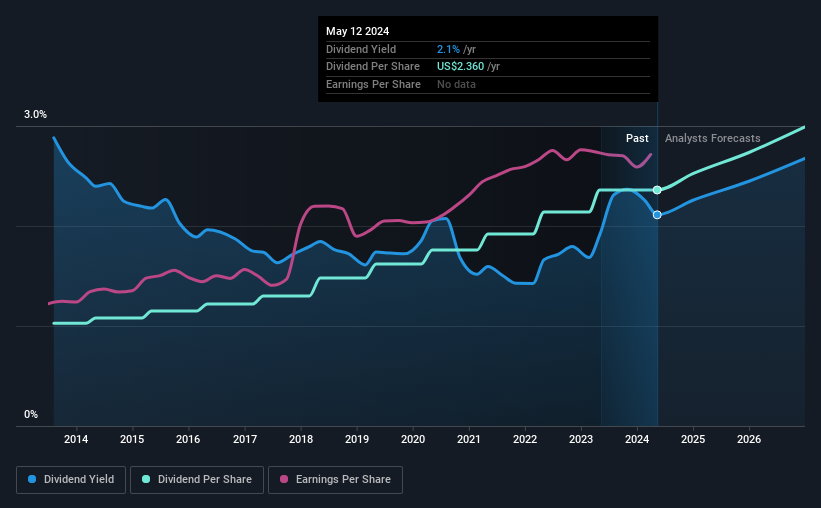Chesapeake Utilities' (NYSE:CPK) Upcoming Dividend Will Be Larger Than Last Year's
Chesapeake Utilities Corporation's (NYSE:CPK) periodic dividend will be increasing on the 5th of July to $0.64, with investors receiving 8.5% more than last year's $0.59. Even though the dividend went up, the yield is still quite low at only 2.1%.
Check out our latest analysis for Chesapeake Utilities
Chesapeake Utilities' Dividend Is Well Covered By Earnings
The dividend yield is a little bit low, but sustainability of the payments is also an important part of evaluating an income stock. Prior to this announcement, Chesapeake Utilities' earnings easily covered the dividend, but free cash flows were negative. No cash flows could definitely make returning cash to shareholders difficult, or at least mean the balance sheet will come under pressure.
The next year is set to see EPS grow by 37.2%. If the dividend continues along recent trends, we estimate the payout ratio will be 44%, which is in the range that makes us comfortable with the sustainability of the dividend.
Chesapeake Utilities Has A Solid Track Record
Even over a long history of paying dividends, the company's distributions have been remarkably stable. The dividend has gone from an annual total of $1.03 in 2014 to the most recent total annual payment of $2.36. This means that it has been growing its distributions at 8.7% per annum over that time. The dividend has been growing very nicely for a number of years, and has given its shareholders some nice income in their portfolios.
Chesapeake Utilities May Find It Hard To Grow The Dividend
Investors could be attracted to the stock based on the quality of its payment history. Earnings per share has been crawling upwards at 3.9% per year. Chesapeake Utilities is struggling to find viable investments, so it is returning more to shareholders. While this isn't necessarily a negative, it definitely signals that dividend growth could be constrained in the future unless earnings start to pick up again.
We should note that Chesapeake Utilities has issued stock equal to 25% of shares outstanding. Trying to grow the dividend when issuing new shares reminds us of the ancient Greek tale of Sisyphus - perpetually pushing a boulder uphill. Companies that consistently issue new shares are often suboptimal from a dividend perspective.
In Summary
In summary, while it's always good to see the dividend being raised, we don't think Chesapeake Utilities' payments are rock solid. With cash flows lacking, it is difficult to see how the company can sustain a dividend payment. Overall, we don't think this company has the makings of a good income stock.
Investors generally tend to favour companies with a consistent, stable dividend policy as opposed to those operating an irregular one. Still, investors need to consider a host of other factors, apart from dividend payments, when analysing a company. For example, we've identified 3 warning signs for Chesapeake Utilities (1 shouldn't be ignored!) that you should be aware of before investing. Looking for more high-yielding dividend ideas? Try our collection of strong dividend payers.
Have feedback on this article? Concerned about the content? Get in touch with us directly. Alternatively, email editorial-team (at) simplywallst.com.
This article by Simply Wall St is general in nature. We provide commentary based on historical data and analyst forecasts only using an unbiased methodology and our articles are not intended to be financial advice. It does not constitute a recommendation to buy or sell any stock, and does not take account of your objectives, or your financial situation. We aim to bring you long-term focused analysis driven by fundamental data. Note that our analysis may not factor in the latest price-sensitive company announcements or qualitative material. Simply Wall St has no position in any stocks mentioned.

 Yahoo Finance
Yahoo Finance 
